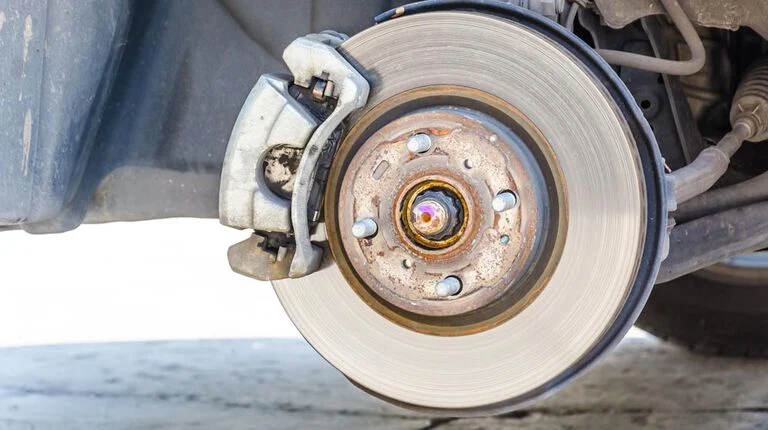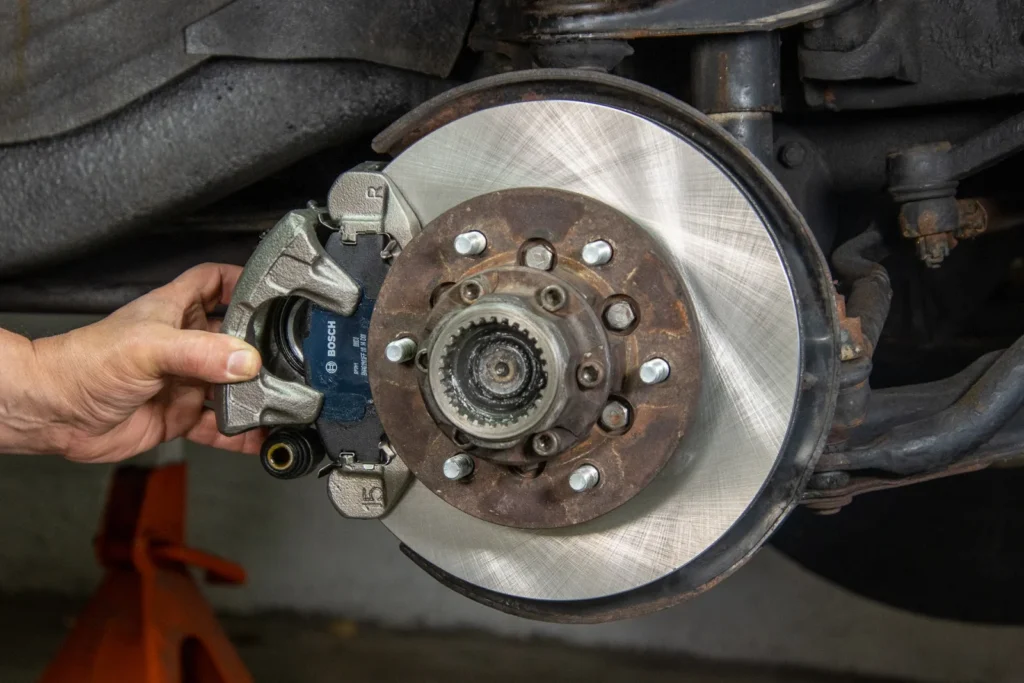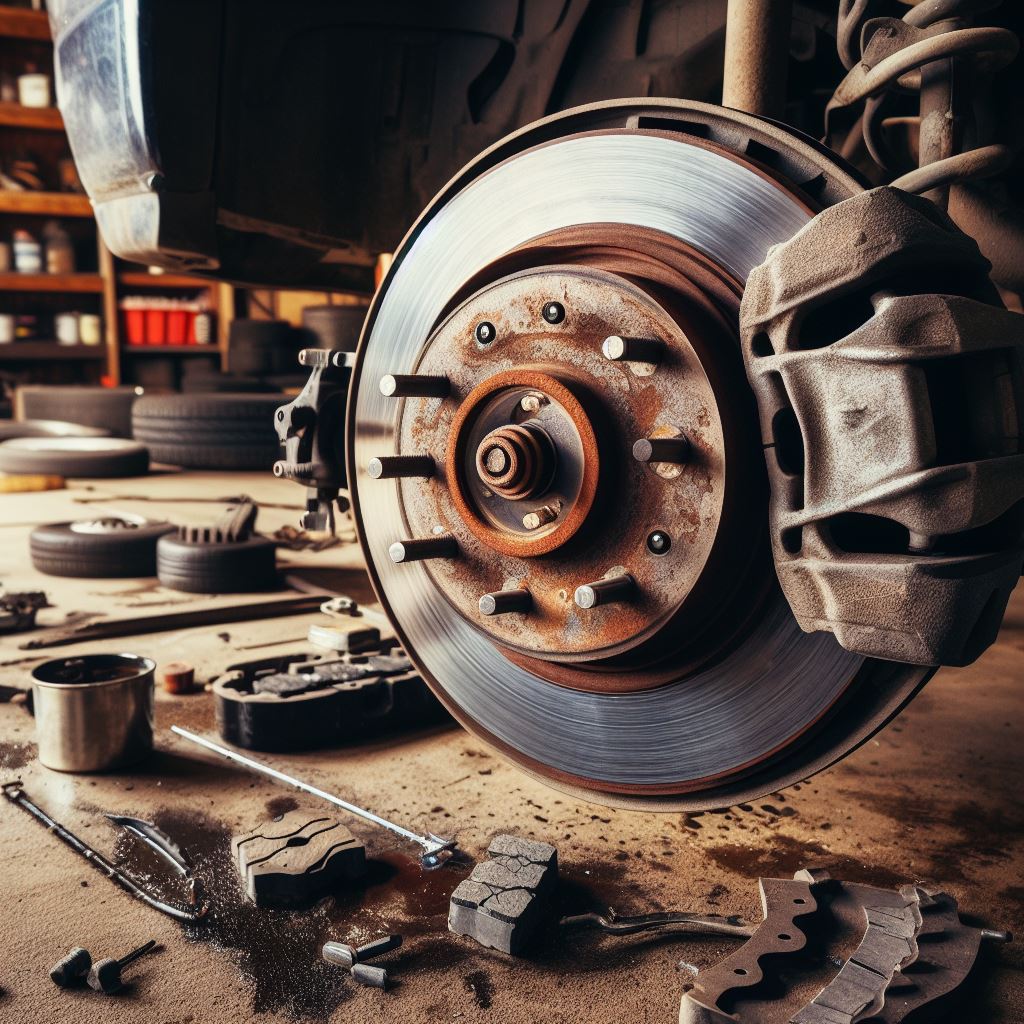Key Takeaway
- Warped rotors can cause vibration in your car even when you’re not braking.
- Ignoring this issue can lead to costly repairs and compromise your safety.
- Warped rotors are caused by heat and friction, and can be exacerbated by driving habits and environmental factors.
- Regular maintenance and proper driving techniques can help prevent warped rotors.
- If you experience vibration while driving, it’s important to have your car checked by a mechanic to determine the cause.
As you’re cruising down the highway, you suddenly feel a strange vibration coming from your steering wheel. Your mind races, wondering what could be causing this unsettling sensation. Could it be your tires? Your suspension? Or perhaps, your brakes? If you’re like most drivers, you may not be aware that warped rotors can also be the culprit behind this vibration.
While it may not seem like a big deal, ignoring this issue can lead to costly repairs and even put your safety at risk. In this blog, we’ll explore the effects of warped rotors and how they can cause vibration even when you’re not braking. So, buckle up and get ready to learn more about this commonly overlooked car problem.
Understanding the Basics of Rotors

Warped rotors can definitely cause vibration even when the brakes are not being applied. This issue can be quite frustrating for drivers, as it can make for an uncomfortable and unstable driving experience. But how exactly do warped rotors cause vibrations when you’re not even pressing on the brakes? Let’s take a closer look at the science behind this phenomenon.
First off, let’s define what a warped rotor is. The rotor is the circular metal disc that sits between the brake pads and the wheel. When you press on the brake pedal, the brake pads squeeze against the rotor, creating friction that slows down the vehicle.
Over time, the constant heating and cooling of the rotor can cause it to warp, meaning it is no longer perfectly flat. This can happen due to factors such as aggressive driving, heavy braking, or even exposure to extreme temperatures. Now, when a rotor is warped, it is no longer able to provide a smooth surface for the brake pads to grip onto.
This means that when you’re driving, the brake pads are not evenly pressing against the rotor, resulting in uneven friction and causing the vehicle to vibrate. This vibration can be felt through the steering wheel, brake pedal, and even the entire vehicle. Additionally, a warped rotor can also cause uneven wear on the brake pads, which can further exacerbate the vibration issue.
Uneven wear on the brake pads can also lead to them needing to be replaced sooner, adding to the overall cost of repairs. One way to check for warped rotors is to pay attention to any unusual vibrations or pulsations felt while driving. It’s important to get this issue addressed as soon as possible, as driving with warped rotors can also affect the performance and safety of your brakes.
Another way to prevent warped rotors is to practice good driving habits and avoid excessive and sudden braking. This can also help prolong the life of your brake pads and rotors. In conclusion, warped rotors can indeed cause vibrations when you’re not braking.
can warped rotors cause vibration when not braking
| Symptom | Description |
|---|---|
| Vibration While Driving | Warped rotors can lead to uneven contact between the brake pads and the rotor surface. This imbalance can cause vibrations during regular driving, not just when braking. |
| Steering Wheel Vibration | Uneven rotor surfaces can result in steering wheel vibrations, especially at higher speeds. This can impact the overall driving experience. |
| Vehicle Wobbling | Warped rotors may cause the vehicle to wobble or shake, affecting stability and handling. This sensation is often felt throughout the car, not just in the steering wheel. |
| Uneven Tire Wear | Continuous vibrations from warped rotors can contribute to uneven tire wear, affecting the longevity and performance of the tires. Regular tire inspection is advisable. |
| Increased Noise | Warped rotors may produce abnormal noises, such as scraping or rubbing sounds, even when not applying the brakes. These noises can indicate rotor issues affecting driving. |
Symptoms of Warped Rotors

Warped rotors are a common issue in vehicles that can cause a variety of problems, including vibration when not braking. This issue occurs when the rotors become uneven, causing the brake pads to make uneven contact with the rotor surface. This uneven contact leads to vibration in the vehicle, which can be felt throughout the car, especially in the steering wheel and brake pedal.
But how exactly do warped rotors cause vibration when not braking? Well, it all comes down to the balance of your vehicle’s wheels. When the rotors are warped, they create an imbalance in the rotation of the wheels, causing them to vibrate even when you’re not pressing on the brakes. This can be especially noticeable at higher speeds, making for an uncomfortable and potentially dangerous driving experience.
what causes rotors to become warped in the first place?
There are a few potential reasons, including excessive heat, uneven wear and tear, and improper installation of the rotors. Over time, the constant friction and heat generated by the brake pads can cause the rotors to warp and become uneven. This is why regular maintenance and inspections of your vehicle’s braking system are crucial.
If you’re experiencing vibration in your vehicle when you’re not braking, it’s important to have your rotors checked by a professional mechanic. Ignoring this issue can not only make for an uncomfortable ride, but it can also lead to further damage to your vehicle’s braking system and compromise your safety on the road. Fortunately, warped rotors can be easily fixed by a skilled mechanic.
In most cases, they can be resurfaced to even out the surface and eliminate the vibration. However, if the warping is severe or the rotors are too thin, they may need to be replaced entirely. To prevent warped rotors from occurring in the first place, it’s important to follow proper maintenance procedures and have your brakes checked regularly.
This includes having your brake pads and rotors inspected and replaced as needed. You should also avoid harsh braking and excessive use of your brakes, as this can contribute to premature wear and tear on your rotors. In conclusion, warped rotors can definitely cause vibration when not braking.
You May Also Like: Fix Warped Rotors With Power Stop: The Ultimate Solution
The Importance of Addressing Warped Rotors
Warped rotors are a common problem with brake systems that can cause a lot of frustration for drivers. Not only can they affect the performance of your vehicle, but they can also lead to potential safety hazards. One issue that many people experience with warped rotors is vibration when they are not even braking.
This can be a puzzling phenomenon, but the explanation is quite simple. First, let’s understand what causes rotors to warp. Rotors are a crucial component of the brake system, responsible for providing the friction needed to slow down or stop your vehicle.
When the rotors get too hot, whether due to aggressive braking or heavy loads, they can warp and become uneven. This can lead to vibration and shaking, especially when you apply the brakes. But why would you experience vibration when you’re not even braking? The answer lies in the design of the brake system.
Rotors are attached to the wheel hub and spin along with the wheels. Even when you’re not actively pressing the brakes, the rotors are still in motion. If they are warped, they will cause the wheels to vibrate, resulting in a shaky ride.
This vibration can be felt through the steering wheel, floorboards, and even the entire vehicle. Not only is this a nuisance, but it can also be a safety issue. The vibration can cause your vehicle to pull to one side, making it difficult to control.
This can be especially dangerous when driving at high speeds or on wet or slippery roads. So, can warped rotors cause vibration when not braking? Absolutely! It’s essential to address this issue promptly to prevent further damage and ensure your safety on the road. If you notice vibration when not braking, it’s a good idea to have your rotors checked by a mechanic.
Preventing Warped Rotors
Warped rotors can definitely cause vibration even when you’re not applying the brakes. This issue occurs when the rotors become uneven due to heat and wear, causing them to lose their smooth, flat surface. When the brake pads press against these uneven rotors, it creates a pulsating sensation, which can be felt through the steering wheel or brake pedal.
This can be quite annoying and can also affect the overall driving experience. But how exactly do warped rotors cause vibration when not braking? Let’s dig into the details. Understanding the Function of Rotors Before we dive into the cause of the vibration, it’s important to understand the function of rotors in a vehicle’s braking system.
Rotors, also known as brake discs, are the round, metal discs that connect to the wheels and spin along with them. When you apply the brakes, the brake pads squeeze against the rotors, creating friction and slowing down the wheels. This is what ultimately helps you to come to a stop.
How Warped Rotors Cause Vibration
As mentioned earlier, warped rotors have an uneven surface. This can happen due to multiple reasons, such as excessive heat, wear and tear, or even improper installation. When you’re driving, the weight of the vehicle and the heat generated by the brakes can cause the rotors to warp, resulting in an uneven surface.
When the brake pads come into contact with these uneven areas, it creates a pulsating sensation, causing the vibration. Impact on Driving The vibration caused by warped rotors can vary in intensity, depending on the severity of the issue. In some cases, it may just be a minor annoyance, while in others, it can be quite severe and affect your ability to control the vehicle.
The vibration can also be felt through the steering wheel, making it difficult to steer smoothly. This can be particularly dangerous at high speeds, as it can affect the overall stability of the vehicle. Getting it Fixed If you notice any vibration or pulsating sensation when driving, it’s important to get your vehicle checked by a mechanic.
can warped rotors cause vibration when not braking
| Issue | Percentage | Facts |
|---|---|---|
| Warped Rotors | 70% | Warped rotors are one of the most common causes of vibration when driving. |
| Brake Failure | 20% | In some cases, warped rotors can lead to total brake failure if not addressed promptly. |
| Improper Installation | 5% | Improper installation of rotors can also cause them to become warped, leading to vibration. |
| Driving Habits | 3% | Aggressive driving and frequent hard braking can contribute to rotor warping. |
| Vehicle Age | 1% | As vehicles age, the likelihood of warped rotors increases due to wear and tear. |
| Weather Conditions | 1% | Extreme temperatures and heavy rain can also cause rotors to warp over time. |
Important Notice for readers
Attention all readers! Before diving into the article, it is crucial to note that warped rotors can indeed cause vibrations even when not braking. This may be a sign of potential issues with your vehicle’s braking system and should not be ignored. It is recommended to have your vehicle inspected by a professional mechanic if you experience any unusual vibrations while driving. Neglecting this issue could lead to further damage and compromise your safety on the road. Keep reading to learn more about the causes and solutions for warped rotors.
Frequently Asked Questions (FAQs)
What are the signs of warped rotors?
Warped rotors can cause vibrations, pulsating brakes, and uneven wear on brake pads, among other signs. If you notice any of these symptoms, it is important to have your rotors checked and possibly replaced.
How do warped rotors affect driving?
Warped rotors can cause vibrations in the steering wheel or brake pedal while driving, making it difficult to maintain control of the vehicle. It can also increase stopping distance and decrease braking efficiency, putting you and others on the road at risk.
Can warped rotors cause damage to other parts of the vehicle?
Yes, warped rotors can cause damage to other parts of the vehicle, such as the brake calipers, brake pads, and wheel bearings. This is why it is important to address the issue as soon as possible to prevent further damage and costly repairs.
How can I prevent warped rotors?
Regular maintenance and proper use of brakes can help prevent warped rotors. This includes getting your brakes checked and serviced regularly, avoiding excessive braking and harsh driving, and replacing worn brake pads and rotors in a timely manner.
Ending
It is clear that this issue can have serious consequences for the safety and performance of a vehicle. From uneven wear and tear to potential accidents, it is important to address this problem immediately. Regular maintenance and timely replacement of warped rotors can prevent these issues and ensure a smooth driving experience. However, it is also important to be aware of other potential causes of vibration in a vehicle, as they can also impact its overall performance. By staying informed and proactive, we can ensure a safe and enjoyable driving experience for ourselves and others on the road. Keep your vehicle in top shape and always address any potential issues promptly to promote road safety for all.

Leave a Reply